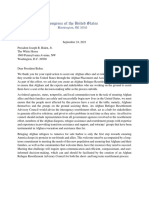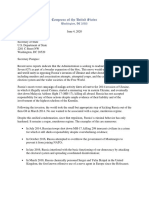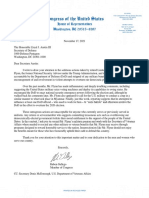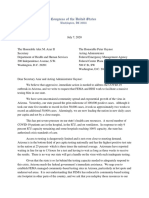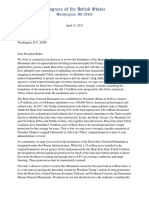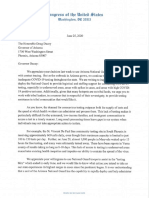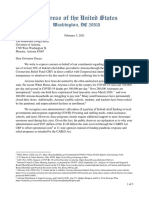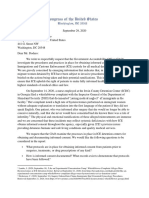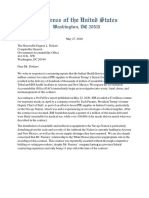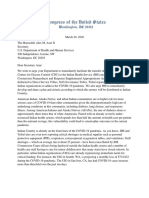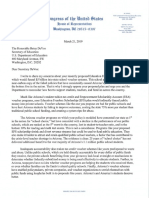Professional Documents
Culture Documents
Rep. Ruben Gallego Demands Answers Regarding Military Readiness
Uploaded by
Congressman Ruben Gallego0 ratings0% found this document useful (0 votes)
218 views7 pagesRep. Ruben Gallego sent a letter to the military Joint Chiefs of Staff demanding information about the effects that unplanned military operations – including President Trump’s diversion of troops and resources to the southwest border – are having on military readiness.
Copyright
© © All Rights Reserved
Share this document
Did you find this document useful?
Is this content inappropriate?
Report this DocumentRep. Ruben Gallego sent a letter to the military Joint Chiefs of Staff demanding information about the effects that unplanned military operations – including President Trump’s diversion of troops and resources to the southwest border – are having on military readiness.
Copyright:
© All Rights Reserved
0 ratings0% found this document useful (0 votes)
218 views7 pagesRep. Ruben Gallego Demands Answers Regarding Military Readiness
Uploaded by
Congressman Ruben GallegoRep. Ruben Gallego sent a letter to the military Joint Chiefs of Staff demanding information about the effects that unplanned military operations – including President Trump’s diversion of troops and resources to the southwest border – are having on military readiness.
Copyright:
© All Rights Reserved
You are on page 1of 7
RUBEN GALLEGO
aan Congress of the United States wes ae
ee House of Representatives emer OFF
NATURAL RESOURCES reer
com eS nce Washington, BE 20515-0307 Pro me 201
March 22, 2019
‘Admiral John M. Richardson
Chief of Naval Operations
United States Navy
2000 Navy Pentagon
Washington, DC 20350-2000
Admiral Richardson:
It has come to my attention that your Marine counterpart, General Robert B. Neller, has
communicated to the Acting Secretary of Defense and Secretary of the Navy that the
Marines’ readiness and ability to meet core missions is being negatively and decisively
affected by unfunded mandates, including southwest border operations
General Neller notes that Marines are working in structures compromised by natural
disasters. He notes that numerous exercises and engagements around the world — critical
for Marines to train to advance to contact, engage the enemy, and destroy him in the field —
are being cancelled or reduced. He notes that the Marines will be forced “to stop hurricane
work in May which is unacceptable.” All of these things are, indeed, unacceptable.
Knowing Department processes, I know that these problems are almost certainly not
limited to the Marine Corps. Furthermore, Congress needs this information to make
funding decisions.
Therefore, in light of the urgency and import this issue, provide a complete assessment of
the readiness risks to the Army that mitror those that General Neller lays out in his memos
to Acting Secretary Shanahan and Secretary Spencer. Ensure that this report includes:
+ Lists of unplanned and unbudgeted factors in FY 2019 that the Navy is managing;
‘+ Lists of cancelled, delayed, or reduced trainings and exercises in FY 2019;
‘* Effects of these cancelled, delayed, or reduced trainings and exercises on the
Navy’s readiness;
‘+ Effects of these cancelled, delayed, or reduced trainings and exercises on alliances
and partnerships;
Effects of raiding current year accounts to fund unplanned and unbudgeted factors
on the solvency of the Navy, and;
© Copies of memoranda from Navy leadership to civilian Departmental leadership
regarding readiness issues over the course of the past two calendar years.
‘Thank you for your immediate attention to this matter of critical importance to the safety
of our servicemembers and to the national defense.
Sincerely,
Ls Abege
Ruben Gallego
Member of Congress
Encl.
(1) Memo from Commandant Neller to Secretary Spencer~ USMC FISCAL YEAR 19
(FY-19) — RAPIDLY ACCELERATING RISKS
(2) Member from Commandant Neller to Acting Secretary of Defense Shanahan —
REQUEST FOR ASSISTNACE IN FUNDING FISCAL YEAR (FY)-I9 HURRICAN
REPAIRS.
DEPARTMENT OF THE NAVY
HEADQUARTERS UNITED STATES MARINE CORPS:
‘3000 MARINE CORPS PENTAGON
‘WASHINGTON, De 20350-3000
19000
cmc
MAR 18 2019
From: Commandant of the Marine Corps
To; Secretary of the Navy
Subj: USMC FISCAL YEAR 19 (FY-19) - RAPIDLY ACCELERATING RISKS
Encl: Memorandum to Secretary of Defense through Secretary of the Navy: REQUEST FOR
ASSISTANCE IN FUNDING FISCAL YEAR (FY)-19 HURRICANE REPAIRS did
Feb 19 2019
1. Mr. Secretary, I am writing to seek your assistance in rectifying FY-19 budget shonfalls forthe
Marine Corps. As you know, the Marine Corps faces fiscal challenges without precedent. Tle inability
to reprogram money and the lack of a supplemental for Hurricane Florence damage is negatively
impacting Marine Corps readiness. While FY-19 was supposed to be a “good year” given an “on-time
enacted budget and higher topline, those positive attributes are now overcome by the negative factors
below, imposing unacceptable risk to Marine Corps combat readiness and solvency. The decisions
outlined in paragraphs 4 and 5 are difficult, and likely to gain the attention of both Congress and the
press, but are nonetheless the types of har! decisions the Marine Corps must make to mitigate fiscal
pressures in FY-19. The following are the unplanned and unbudgeted factors now defining FY-19:
a, Hurricanes Florence and Michael
b. OMMC Congressional mark just prior to the FY that includes significant reductions apportioned to
‘Marine Reserve funding for multiple unit activations in support of the Global Force Management plan
¢. Unplanned/unbudgeted Southwest Border Operations
4. Unplanned/unbudgeted Dynamic Force Employment (DFE)
©. OSD(P) directed, but unfunded force increase to Marine Rotational Force-Darwin (MRF-D)
£.Unplanned/unbudgeted Congressional mandate for aqueous free-forming foam (AFFF) upgrade
£ Unplanned/unbudgeted basic allowance for housing (BAH) adjustments to privatized housing
h, Unplanned/unbudgeted civilian pay raise
i. Border security funding transfers, especially with respect (o impacts on general transfer authority
2. As highlighted in the enclosed 19 Feb 2019 memorandum to the acting Secretary of Defense through
you, “[t)he effects of internal funding will rapidly accelerate throughout the rest of the Marine Corps as
‘we realign funding of exercise plans, unit training, equipment readiness accounts, and investment
accounts.” That assessment, from less than one month ago, was made given the assumption that we
would be able to realign funding to rebalance risk to address the unplanned/anbudgeted conditions listed
above through the regular order practice of above-threshold reprogramming. However, itis becoming
increasingly unlikely that we will be able to reprogram funds in year of execution.
You might also like
- A Heartbreaking Work Of Staggering Genius: A Memoir Based on a True StoryFrom EverandA Heartbreaking Work Of Staggering Genius: A Memoir Based on a True StoryRating: 3.5 out of 5 stars3.5/5 (231)
- The Sympathizer: A Novel (Pulitzer Prize for Fiction)From EverandThe Sympathizer: A Novel (Pulitzer Prize for Fiction)Rating: 4.5 out of 5 stars4.5/5 (119)
- Never Split the Difference: Negotiating As If Your Life Depended On ItFrom EverandNever Split the Difference: Negotiating As If Your Life Depended On ItRating: 4.5 out of 5 stars4.5/5 (838)
- Devil in the Grove: Thurgood Marshall, the Groveland Boys, and the Dawn of a New AmericaFrom EverandDevil in the Grove: Thurgood Marshall, the Groveland Boys, and the Dawn of a New AmericaRating: 4.5 out of 5 stars4.5/5 (265)
- The Little Book of Hygge: Danish Secrets to Happy LivingFrom EverandThe Little Book of Hygge: Danish Secrets to Happy LivingRating: 3.5 out of 5 stars3.5/5 (399)
- Grit: The Power of Passion and PerseveranceFrom EverandGrit: The Power of Passion and PerseveranceRating: 4 out of 5 stars4/5 (587)
- The World Is Flat 3.0: A Brief History of the Twenty-first CenturyFrom EverandThe World Is Flat 3.0: A Brief History of the Twenty-first CenturyRating: 3.5 out of 5 stars3.5/5 (2219)
- The Subtle Art of Not Giving a F*ck: A Counterintuitive Approach to Living a Good LifeFrom EverandThe Subtle Art of Not Giving a F*ck: A Counterintuitive Approach to Living a Good LifeRating: 4 out of 5 stars4/5 (5794)
- Team of Rivals: The Political Genius of Abraham LincolnFrom EverandTeam of Rivals: The Political Genius of Abraham LincolnRating: 4.5 out of 5 stars4.5/5 (234)
- Shoe Dog: A Memoir by the Creator of NikeFrom EverandShoe Dog: A Memoir by the Creator of NikeRating: 4.5 out of 5 stars4.5/5 (537)
- The Emperor of All Maladies: A Biography of CancerFrom EverandThe Emperor of All Maladies: A Biography of CancerRating: 4.5 out of 5 stars4.5/5 (271)
- The Gifts of Imperfection: Let Go of Who You Think You're Supposed to Be and Embrace Who You AreFrom EverandThe Gifts of Imperfection: Let Go of Who You Think You're Supposed to Be and Embrace Who You AreRating: 4 out of 5 stars4/5 (1090)
- Her Body and Other Parties: StoriesFrom EverandHer Body and Other Parties: StoriesRating: 4 out of 5 stars4/5 (821)
- The Hard Thing About Hard Things: Building a Business When There Are No Easy AnswersFrom EverandThe Hard Thing About Hard Things: Building a Business When There Are No Easy AnswersRating: 4.5 out of 5 stars4.5/5 (344)
- Hidden Figures: The American Dream and the Untold Story of the Black Women Mathematicians Who Helped Win the Space RaceFrom EverandHidden Figures: The American Dream and the Untold Story of the Black Women Mathematicians Who Helped Win the Space RaceRating: 4 out of 5 stars4/5 (890)
- Elon Musk: Tesla, SpaceX, and the Quest for a Fantastic FutureFrom EverandElon Musk: Tesla, SpaceX, and the Quest for a Fantastic FutureRating: 4.5 out of 5 stars4.5/5 (474)
- The Unwinding: An Inner History of the New AmericaFrom EverandThe Unwinding: An Inner History of the New AmericaRating: 4 out of 5 stars4/5 (45)
- The Yellow House: A Memoir (2019 National Book Award Winner)From EverandThe Yellow House: A Memoir (2019 National Book Award Winner)Rating: 4 out of 5 stars4/5 (98)
- On Fire: The (Burning) Case for a Green New DealFrom EverandOn Fire: The (Burning) Case for a Green New DealRating: 4 out of 5 stars4/5 (73)
- Rep. Gallego Afghan Resettlement Advisory Council LetterDocument2 pagesRep. Gallego Afghan Resettlement Advisory Council LetterCongressman Ruben GallegoNo ratings yet
- Letter To Sec. Pompeo: Keep Russia Out of The G7Document2 pagesLetter To Sec. Pompeo: Keep Russia Out of The G7Congressman Ruben GallegoNo ratings yet
- WIMA Bill TextDocument9 pagesWIMA Bill TextCongressman Ruben GallegoNo ratings yet
- 11-17 Gallego Flynn LetterDocument1 page11-17 Gallego Flynn LetterCongressman Ruben GallegoNo ratings yet
- Reps. Gallego, Grijalva, Kirkpatrick, and Stanton Urge Every Nursing Home in Arizona To Voluntarily Release COVID-19 DataDocument2 pagesReps. Gallego, Grijalva, Kirkpatrick, and Stanton Urge Every Nursing Home in Arizona To Voluntarily Release COVID-19 DataCongressman Ruben GallegoNo ratings yet
- Rep. Gallego Leads House Democrats To Request FEMA Testing Blitz in ArizonaDocument2 pagesRep. Gallego Leads House Democrats To Request FEMA Testing Blitz in ArizonaCongressman Ruben GallegoNo ratings yet
- Ducey Letter ARPA and Prop 208Document3 pagesDucey Letter ARPA and Prop 208Congressman Ruben GallegoNo ratings yet
- Reps. Gallego and Grijalva Lead Call To Restore and Expand Protections For Bears Ears National MonumentDocument4 pagesReps. Gallego and Grijalva Lead Call To Restore and Expand Protections For Bears Ears National MonumentCongressman Ruben GallegoNo ratings yet
- Rep. Gallego Community Project Funding AnnouncementDocument4 pagesRep. Gallego Community Project Funding AnnouncementCongressman Ruben GallegoNo ratings yet
- Reps. Gallego, Grijalva, Kirkpatrick, and O'Halleran Ask Gov. Ducey About Deploying AZ National Guard To Assist With COVID-19 TestingDocument2 pagesReps. Gallego, Grijalva, Kirkpatrick, and O'Halleran Ask Gov. Ducey About Deploying AZ National Guard To Assist With COVID-19 TestingCongressman Ruben GallegoNo ratings yet
- AZ Dems Ducey CARES Act Funding Priorities LetterDocument3 pagesAZ Dems Ducey CARES Act Funding Priorities LetterCongressman Ruben GallegoNo ratings yet
- Rep. Gallego Proposal: Small Business Economic Assistance ProgramDocument3 pagesRep. Gallego Proposal: Small Business Economic Assistance ProgramCongressman Ruben GallegoNo ratings yet
- AZ Dems Ducey CARES Act Funding Priorities LetterDocument3 pagesAZ Dems Ducey CARES Act Funding Priorities LetterCongressman Ruben GallegoNo ratings yet
- GAO Investigation Request ICEDocument3 pagesGAO Investigation Request ICECongressman Ruben GallegoNo ratings yet
- Rep. Gallego Letter To Gov. Ducey Re: COVID-19Document2 pagesRep. Gallego Letter To Gov. Ducey Re: COVID-19Congressman Ruben Gallego100% (1)
- Navajo Contract GAO LetterDocument2 pagesNavajo Contract GAO LetterCongressman Ruben GallegoNo ratings yet
- IHS CDC COVID-19 Funds Oversight LetterDocument4 pagesIHS CDC COVID-19 Funds Oversight LetterCongressman Ruben GallegoNo ratings yet
- Rep. Gallego Letter To Phoenix VADocument2 pagesRep. Gallego Letter To Phoenix VACongressman Ruben GallegoNo ratings yet
- Letter To SECDEF From Reps. Gallego and LieuDocument1 pageLetter To SECDEF From Reps. Gallego and LieuCongressman Ruben GallegoNo ratings yet
- VA Quality Health Care Accountability and Transparency ActDocument6 pagesVA Quality Health Care Accountability and Transparency ActCongressman Ruben GallegoNo ratings yet
- Navajo Contract GAO LetterDocument2 pagesNavajo Contract GAO LetterCongressman Ruben GallegoNo ratings yet
- Letter To SBA-Treasury On PPP Rules For BanksDocument4 pagesLetter To SBA-Treasury On PPP Rules For BanksCongressman Ruben GallegoNo ratings yet
- Reps. Gallego and DeGette Lead 74 Representatives in Letter Opposing Administration Plan To Strip Protections From Tongass National ForestDocument7 pagesReps. Gallego and DeGette Lead 74 Representatives in Letter Opposing Administration Plan To Strip Protections From Tongass National ForestCongressman Ruben GallegoNo ratings yet
- Rep. Gallego, Letter To VA, RE Mobility Equipment 9.20.2019Document4 pagesRep. Gallego, Letter To VA, RE Mobility Equipment 9.20.2019Congressman Ruben GallegoNo ratings yet
- Rep. Gallego Seeks Answers On Burdensome VA Prescription Reimbursement RequirementsDocument2 pagesRep. Gallego Seeks Answers On Burdensome VA Prescription Reimbursement RequirementsCongressman Ruben GallegoNo ratings yet
- Reps. Gallego, Grijalva and Haaland Demand Answers On National Park Service Changes To National Historic PreservationDocument2 pagesReps. Gallego, Grijalva and Haaland Demand Answers On National Park Service Changes To National Historic PreservationCongressman Ruben GallegoNo ratings yet
- Rep. Ruben Gallego Introduces Resolution To Recognize Native American VeteransDocument5 pagesRep. Ruben Gallego Introduces Resolution To Recognize Native American VeteransCongressman Ruben GallegoNo ratings yet
- Rep. Ruben Gallego Slams Secretary DeVos's School Voucher PlanDocument2 pagesRep. Ruben Gallego Slams Secretary DeVos's School Voucher PlanCongressman Ruben GallegoNo ratings yet
- Arizona House Democrats To DHS: We Need A Federal Crisis Coordinator at The BorderDocument3 pagesArizona House Democrats To DHS: We Need A Federal Crisis Coordinator at The BorderCongressman Ruben GallegoNo ratings yet









































